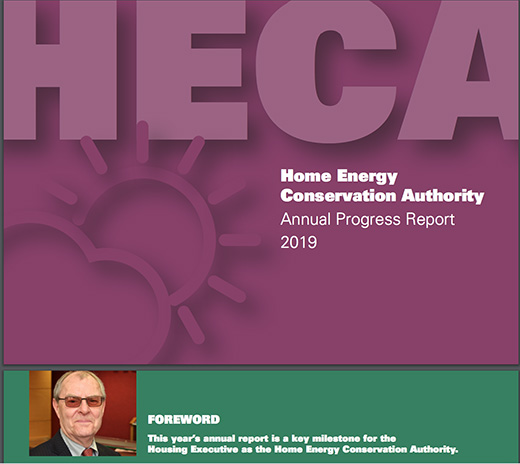Continued investment in energy efficiency measures leads to reduced levels of fuel poverty says NIHE.
- Fuel Poverty is defined as circumstances where a household, in order to maintain an acceptable level of temperature throughout the home, would have to spend more than 10% of its income on all household fuel.
The Housing Executive has published the Home Energy Conservation Authority (HECA) Progress Report 2019 demonstrating how energy efficiency investment has reduced fuel poverty in Northern Ireland.
During the last financial year, the Housing Executive invested over £24 million across energy efficiency measures in 7,963 of its own properties. While across the private sector, over £16 million has been spent on improving 5,895 homes through the Department for Communities’ Affordable Warmth and Boiler Replacement schemes.
The Northern Ireland Sustainable Energy Programme facilitated £7.4 million of energy efficiency measures last year, in a scheme delivered by a range of organisations and managed by the Energy Saving Trust on behalf of the Utility Regulator.

The 2016 NI House Condition Survey (HCS) indicates the percentage of NI households in Fuel Poverty is now recorded as 22% (160,000) which compares favourably with the figures for Wales (23%) and Scotland (27%). The findings of the 2016 HCS indicate that there has been a 20% reduction in the level of Fuel Poverty[i], compared with the position based on the findings of the 2011 HCS.
Estimates based on work carried out by the Housing Executives Research Department in the intervening period from 2016, indicates that Fuel Poverty within Northern Ireland has decreased to 18% in 2018.
The Housing Executive continues to lead the €2 million EU Northern Periphery and Artic Programme (NPA) HANDIHEAT project and works as lead partner with six academic, research and social enterprise partners across five European countries, developing work packages to improve energy efficiency and low carbon technologies for rural communities. The project is due to complete in 2021.
Speaking at the launch of the 2019 HECA Annual Progress Report, the Housing Executive’s Sustainable Development Manager Robert Clements said: “The last year has seen continued investment into energy efficiency measures across all housing tenures in Northern Ireland and a continued downward pressure on fuel poverty.
“In the year when our national government declared an ambition to achieve net zero by 2050, the importance of energy efficiency and low carbon technologies will be crucial in reducing our carbon footprint and continuing to tackle fuel poverty.”

























